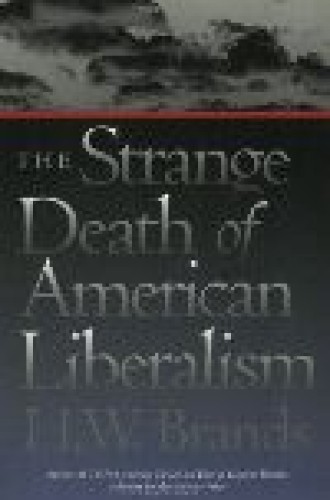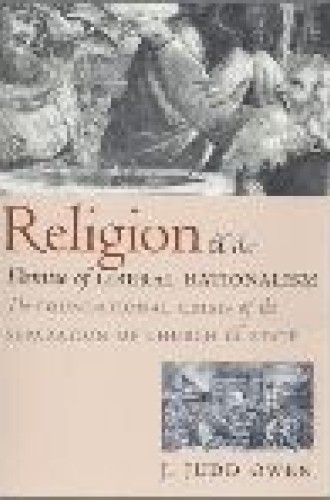The liberal choice
Liberalism in America is either dying or alive and well—depending on whom you listen to or how you define the term. The practical liberalism of FDR’s New Deal and LBJ’s Great Society has lately appeared to be moribund as a political force. Yet liberalism as a political theory, understood as a cooperative enterprise for mutual advantage among free and equal persons, is considered by friend and foe alike the essential expression of what it means to be a political animal in the modern West. These two books address these quite different understandings of liberalism, and reach quite different conclusions about its prospects.
H. W. Brands, a historian at Texas A&M, offers not so much an obituary as an autopsy of liberalism. His thesis is striking and simple: Americans always have been conservative in the sense that they are distrustful of big government and skeptical of its efficacy and legitimacy. The “one conspicuous exception” is wartime: “In the name of national defense—most conspicuously during wartime—Americans accepted an expansion of government authority that they tolerated under no other circumstances.”
Brands’s reading of American history in light of this hypothesis is plausible if not always convincing. Periods which appear as a triumph of liberalism, especially the period from the New Deal to the Great Society, are anomalies which last only as long as the crises of national security which gave rise to them. The cold war was the “real” foundation of post–World War II liberalism; the end of the cold war marked the “death” of practical liberalism. Following Brands’s logic, this death is strange since the patient was never really alive to begin with, but existed only parasitically upon people’s concern with national survival.
Although Brands’s account is stimulating, I would raise two critical points. First, it is not clear why, even if Brands is right, liberals should be downhearted. The cold war may be over, but isolationism is not in the cards for the world’s “one remaining superpower.” Serving as international policeman will require a massive governmental apparatus. If “liberal” periods in our history are the security-based exceptions to the rule of a skeptical libertarianism, the exception is perhaps the rule if security concerns are a constant in American life.
Second, conservatism for Brands is essentially libertarianism—a distrust of governmental authority and a fear of expansive governmental power. Assuming these traits are fundamental to the American political mind, most political theorists see this as reflecting the classical liberal mind—distinct from the “modern liberal” view which accepts the legitimacy of the welfare state—not a conservative mind. “Conservatism,” unlike liberalism and libertarianism, maintains that the state may, and indeed must in some respects, aim at shaping the moral character of its citizens. This sort of moralistic, communitarian conservatism, an important and growing force in American politics, is often at odds with the libertarianism that Brands calls conservative. Brands ignores it, though at one point he does announce the difference between “the genuine conservatism of small government and the pseudo-conservatism of ‘family values.’” What is left unclear is why communitarian conservatism is the pseudo form while libertarianism is the real thing.
This is not to argue over what American conservatism really is, but to point out that beyond the libertarianism Brands champions there is a broader sense of “liberal” that includes both his libertarianism and the welfare- state liberalism rejected by it. This liberalism is defined by its vision of society as a contract among naturally free and equal persons, and its antitypes are communitarian visions of the left (socialist, egalitarian community) and of the right (traditional, hierarchical, moralistic community). This broader liberalism may oscillate between its libertarian and welfare-state expressions, but it stands as orthodoxy in America because those are the dimensions that define us as a nation. So if, as Brands argues, libertarianism is genuinely American and moralistic communitarianism is not, this may be evidence not of the strange death but of the everlasting life of American liberalism.
Judd Owen addresses liberalism in this more general sense. Owen, an assistant professor of political science at Emory, believes that liberal political institutions are poorly served by contemporary liberal theorists who speak in their defense. His criticism is directed at the “antifoundationalism” that now characterizes liberal political thought. Owen says that liberal institutions, especially those embodying religious freedom and the separation of church and state, were spawned by the Enlightenment. Enlightenment liberals believed liberal institutions to be the rationally best institutions. They were worthy of affirmation and support not simply because they were “ours,” but because they were deemed the universally best, as evidenced by reason.
This foundationalist understanding of liberalism is decidedly out of fashion these days. Owen traces antifoundationalism back to the attack on the pretensions of reason launched by Nietzsche in the 19th century. What is new is that liberals themselves have increasingly come to embrace the antifoundationalism that was once deployed against them, abandoning their Enlightenment heritage of rationalism. Owen describes antifoundationalism as follows:
All claims to knowledge are from a particular human, all too human, perspective, or are socially constructed. There is nothing to which we can appeal in order to settle the most profound human disagreements, and thus there is no possibility that the awesome variety of conflicting opinions about the things most important to human beings, including the best political order, can be transcended toward universal and objective knowledge. The original claim that liberalism is grounded in natural right and reason and therefore the claim that it is universally legitimate are naïve and even arrogant fictions.
The question is whether liberal institutions need philosophical foundations in order to survive and flourish. Richard Rorty is the most well-known exponent of the view that they do not, and Rorty, along with Stanley Fish and John Rawls, is a primary target of Owen’s criticism.
Rorty debunks Enlightenment rationalism, renaming it “postmodern, bourgeois liberalism.” He openly proclaims liberalism to be “ethnocentric,” but cheerfully embraces it because it is, after all, “ours.” “We” are the citizens of the “rich, North Atlantic democracies,” and our institutions require our allegiance, which has little if anything to do with philosophical foundations. Indeed, Rorty believes that the (false) belief that our institutions are only as good as their philosophical foundations is itself a serious impediment to our affirmation of them. To put it in religious terms, Rorty’s view is that it is faith, not theology, that matters, and too much theology can be at odds with a living faith.
Fish shares Rorty’s antifoundationalism, and while he does not attack or reject liberal institutions, he is merciless in revealing the philosophical confusions that characterize many of their theoretical defenses. Rawls is a slightly different case. Unlike Rorty and Fish, he neither denies nor affirms the tenets of rationalist foundationalism, but he has decided that liberal institutions are best defended not in terms of their truth, but as part of our historical inheritance. Many different religious and philosophical views can be used to support liberal institutions, and Rawls is concerned with the pragmatic fact of affirmation, not with the truth of the grounds from which that affirmation arises. So Owen is correct, I think, in placing Rawls, Fish and Rorty in the same analytical category.
I don’t think Owen succeeds in showing that politics needs philosophical foundation, though his book is an excellent resource for engaging that difficult and important question. Part of the problem is Owen’s ambiguous stance as an author. He describes himself as a “friend of liberalism” rather than a liberal, and so one is never quite sure which aspects of liberalism he accepts. More important, his aim is to present the case for foundationalism in general, which is not the same as actually presenting the case for any particular foundationalist account purporting to be true. If one were persuaded by Owen that it is desirable to have philosophical foundations for liberal institutions, one would still be no closer to having them.
Owen’s response to Rorty and Fish turns out to be relatively meek. His claim is that they have failed to “decisively refute” liberal rationalism insofar as they have failed to show that it is impossible. Therefore, the admittedly “Herculean task” of articulating a particular, true account of liberal rationalism remains a possibility. While this is true, it is doubtful that either Rorty or Fish would disagree, or take the point as criticism of their own views. I imagine Rorty responding like this: “No one has ‘decisively refuted’ the existence of witches or gods in the sense of proving their impossibility, but this by itself provides no reason for me to change my current belief, which is that both are figments of the human imagination. Produce one, and I’ll change my mind. But I am not impressed to know that it has not been proven impossible that one might someday be produced.”
The real issue for the health of liberal institutions, it seems to me, is not philosophical foundations, but social and cultural foundations. Like all regimes, liberal ones seek to nurture individual characters who will support and cherish that regime so as to perpetuate it. Unlike all regimes, liberal ones recognize limits upon their right to pursue that aim directly, since they must respect the legitimate freedom of individuals and individuals in association with one another to pursue their own conceptions of what is good and valuable in life. In a fortunate liberal regime, the forms of group, family and associational life characteristic of civil society yield citizens who cherish liberal political institutions, though perhaps for different reasons. In an unfortunate liberal regime (which probably won’t be liberal for long), the forms of group, family and associational life yield indifferent or even illiberal citizens. When the political state has to move in the direction of forcing associational life in a liberal-yielding direction, the liberal regime is weakened, if not undermined. So political liberals have an enormous interest in the social and cultural foundations of associational life in liberal regimes.
For example, even though the liberal state has no right to require its citizens who are Christians to accept Locke’s proposition that toleration and a respect for religious freedom are the marks of the correct understanding of the Gospels, it has every reason to hope that they do, and perhaps to do more than hope—to educate and persuade, if not to coerce. The communitarian critique of liberalism, whatever one may think of it as philosophy, has succeeded in reminding liberals that liberalism does have social and cultural presuppositions, and that these must be attended to if liberalism is to survive.
Nowhere have the weak social foundations of American liberal institutions been more evident than in the battered and tattered nature of the welfare state, and in the cynicism with which it is viewed by nearly the entire populace—from the wealthy to the poor, for different reasons. The liberalism of the past generation expressed the ethos of the welfare state in terms of individual right and entitlement, a language ill-suited to the needs of community. What is needed, and what may or may not be available to us, is the possibility of expressing that ethos in the language of shared need as a common body.






